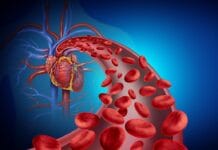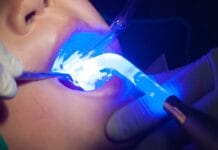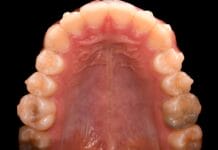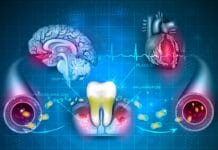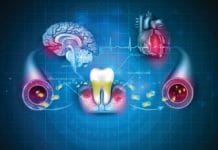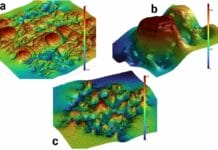Are you in need of CE credits? If so, check out our peer-reviewed, self-study CE courses here.
Test Your Nutrition & Oral Health Knowledge!
Which of the following is a symptom of vitamin B deficiency?
Vitamin B deficiency can manifest in a range of symptoms such as dermatitis, paresthesia, anemia, and oral manifestations. Oral manifestations include angular cheilitis, glossitis, and in some cases, gingival bleeding. Additionally, studies have indicated an inverse association between vitamin B12 serum levels and the severity of periodontal disease.
Najeeb, S., Zafar, M.S., Khurshid, Z., Zohaib, S., Almas, K. The Role of Nutrition in Periodontal Health: An Update. Nutrients. 2016; 8(9): 530. doi:10.3390/nu8090530 Retrieved from https://pubmed.ncbi.nlm.nih.gov/27589794/
Which of the following antioxidants may prevent cancer, cardiovascular disease, enhance periodontal health, and is found in tomatoes, carrots, and watermelons?
Lycopene is found in tomatoes, carrots, and watermelons. Studies indicate it may prevent cancer and cardiovascular disease due to its antioxidant effects. Some studies have investigated the use of lycopene as an adjunct to non-surgical periodontal therapy; one such study suggested lycopene supplementation may enhance periodontal health.
Najeeb, S., Zafar, M.S., Khurshid, Z., Zohaib, S., Almas, K. The Role of Nutrition in Periodontal Health: An Update. Nutrients. 2016; 8(9): 530. doi:10.3390/nu8090530 Retrieved from https://pubmed.ncbi.nlm.nih.gov/27589794/
A pure vegetarian diet may lead to iron deficiency. Iron deficiency oral manifestations are like vitamin B deficiencies, including angular cheilitis, glossitis, and burning mouth syndrome.
Iron deficiencies can occur due to nutritional deficits, blood loss, hypothyroidism, vitamin C deficiency, defects in iron absorption, and a pure vegetarian diet. Iron deficiency and vitamin B deficiency share similar oral manifestations, which include angular cheilitis, glossitis, and burning mouth syndrome.
Rahman, N., Walls, A. Chapter 12: Nutrient Deficiencies and Oral Health. Monogr Oral Sci. 2020; 28: 114-124. doi:10.1159/000455379. Retrieved from https://pubmed.ncbi.nlm.nih.gov/31940618/
Poly-unsaturated fatty acids prevent tissue damage by downregulation of pro-inflammatory gene expression.
Poly-unsaturated fatty acids are involved in the downregulation of pro-inflammatory gene expression. A metabolite, N-3 PUFA, has been shown to prevent neutrophil-mediated tissue damage, providing a protective effect on gingival health. Additionally, low intake of another metabolite produced by poly-unsaturated fatty acids, docosahexaenoic acid, is indicated in a 1.5 times higher incidence of periodontal disease progression.
Rahman, N., Walls, A. Chapter 12: Nutrient Deficiencies and Oral Health. Monogr Oral Sci. 2020; 28: 114-124. doi:10.1159/000455379. Retrieved from https://pubmed.ncbi.nlm.nih.gov/31940618/
Poultry, meat, fish, nuts, seeds, and cereal are good dietary sources for which nutrient?
Poultry, meat, fish, nuts, seeds, and cereal are good dietary sources of vitamin E. Vitamin E deficiency contributes to impaired gingival wound healing. Several studies indicate healthy levels of vitamin E controls inflammation and maintain periodontal health.
Najeeb, S., Zafar, M.S., Khurshid, Z., Zohaib, S., Almas, K. The Role of Nutrition in Periodontal Health: An Update. Nutrients. 2016; 8(9): 530. doi:10.3390/nu8090530 Retrieved from https://pubmed.ncbi.nlm.nih.gov/27589794/
Melatonin is a potent antioxidant secreted by various organs and is found in plants and cereals. In supplement form, the antioxidative properties are more potent than vitamin E.
Though not classified as a major nutrient, melatonin is a potent antioxidant that is secreted by various organs of the human body. It is also found in plants and cereals. In supplement form, the antioxidant properties are more potent than those of vitamin E. Studies in animals show melatonin reduces bone resorption caused by induced periodontitis, lending to the suggestion that topical melatonin may be a useful adjunct to surgical and non-surgical periodontal therapy.
Najeeb, S., Zafar, M.S., Khurshid, Z., Zohaib, S., Almas, K. The Role of Nutrition in Periodontal Health: An Update. Nutrients. 2016; 8(9): 530. doi:10.3390/nu8090530 Retrieved from https://pubmed.ncbi.nlm.nih.gov/27589794/
Reduced protein intake improves salivary function.
Protein deficiency can cause salivary gland dysfunction. Protein deficiency is associated with reduced salivary flow rate, decreased buffering capacity, overall causing reduced salivary defense capacity, reduced salivary flow, weakened tooth integrity, and increased risk of caries.
Rahman, N., Walls, A. Chapter 12: Nutrient Deficiencies and Oral Health. Monogr Oral Sci. 2020; 28: 114-124. doi:10.1159/000455379. Retrieved from https://pubmed.ncbi.nlm.nih.gov/31940618/


